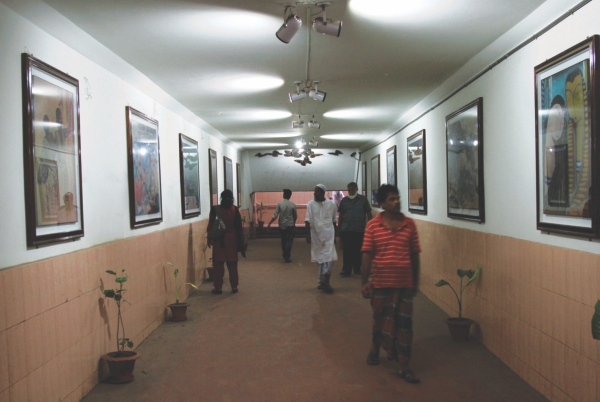| Home - Back Issues - The Team - Contact Us |
 |
| Volume 11 |Issue 45| November 16, 2012 | |
|
|
Letters The Man Behind the Legend! “Shei tumi keno eto ochena holey” — In the 90s, this song was so popular among us that at every concert we would request bands for this number even if they played totally different genres of music. I would like to hank to the Star for acquainting us with the composer of this song – the maestro guitarist of our country Ayub Bachchu. The well-informed article gave a glimpse of the person behind such legendary songs such as “mon shudhu mon chhuyechhe”, “ami kosto pete bhalobashi” and many more. Seeing Ayub Bachchu today, one could hardly believe that he too had to fight against his family's will to become an icon and struggle to the top. We also came to know from Ayub Bachchu himself, how we as listeners, exerted pressure on the artistic mind, limiting them to experiment with their music. Through the Star, I urge Ayub Bachchu fans to join our beloved musician in his battle against piracy. Famanna Zaman *** Your cover story "The Man Behind the Legend" dated November 9, 2012 was a pleasant read. In the world of rock-music Ayub Bachchu is considered one of the leading rock stars in South-East Asia. I am happy to say that he has no ego or pride rather, he is very polite and humble in his day-to-day living. My grandson, Faisal has become a very promising guitarist. He is now playing with a local rock band in Dhaka. He says that what he has learnt from Bachchu is dedication and a vision to gain positive results by practising music. He expresses his gratitude to him for helping him build his career. His son and daughter appreciate their father's care and love for the entire family. He is a man of merit and resourcefulness in our times. Let us hope that he may guide the younger generation to attain the glory of music in this part of the world. Abul Ashraf Noor Bad Omen for Reform
This year in June, violent riots broke out in the Rakhine State of Myanmar and thousands of Rohingya Muslims were persecuted and made to flee to neighbouring Bangladesh. The Burmese government's reaction to the riot did not appear favourable for the Rohingyas and the hostility the Burmese government holds against them became clear through President Thein Sein's comments. What surprises me, is the US government's less than expected concern over this issue. During the riots, the international community including the US appeared more concerned about Bangladesh's role in not allowing the refugees to cross the border into Bangladesh than putting pressure on the Burmese government to stop the injustice against the Rohingya community. And now the US government's revived interest towards Myanmar, disregarding the way they treat their minorities, raises question about the democratic values of the US. I wonder how genuine is the US in its belief, in its attempt to make the world a better place? Protibha Roy
You Want an Eye for an Eye? The article published in the last issue, titled “Like a Phoenix From the Ashes”, written by Farah Ghuznavi was a thought-provoking one. Most of us are more or less ashamed of the incident that happened in Ramu. To express that, we said sorry through video clips published on facebook, we said sorry by poster demonstrations (something that happened in my campus), we said sorry by releasing paper lanterns on Probarona Purnima. But still, there are people who need enlightenment, people who think we don't really need to do all this. This is because Muslims are also being killed by Burmese people in Myanmar. It sounds more like the proverb “An eye for an eye”, but they have forgotten that if we really follow this rule, soon the world will become blind! Thousands of Muslims are also being killed in Iraq and Afghanistan, why don't we set fire to the churches too? Violence against the Muslims is happening around the world and if we take revenge this way, we are no different from those violent people. Why should we follow those who are worse than us? Why don't we act according to our conscience and set an example? Farah Moriam A Remarkable Transformation! I was astonished to see the photo feature published in the November 2, 2012 issue of the Star. Before reading the accompanying description, I thought the photographs must be of an exhibition or an Andrew Eagle's piece about some subways abroad. Reading the captions, I could hardly believe that the pictures were from the very underpass I used to take almost every afternoon to reach my former office in Kawran Bazar. It was so dark and filthy and sometimes the floors were flooded with stagnant water (who knows from where) that I dreaded the short journey every time I had to take that route. There were so many days when I had taken the risk of jay walking instead of using that hell hole. Since my office shifted to a new location I no longer need to use the underpass. Yet the photo feature has made me curious to about visiting the place once again. I hope Dhaka City Corporation, both north and south, will take other such innovative measures in the walkways all over the city. Teetli Sarkar The Lost Wanderer The reflection published in the November 2, 2012 issue of the Star is a really good read. I want to thank the writer for such a heart rendering piece and the Star for publishing something a little different from its usual articles. The writing felt like a peaceful melody amongst other serious articles. Rozina Hoque
Copyright (R) thedailystar.net 2012 |
||||

